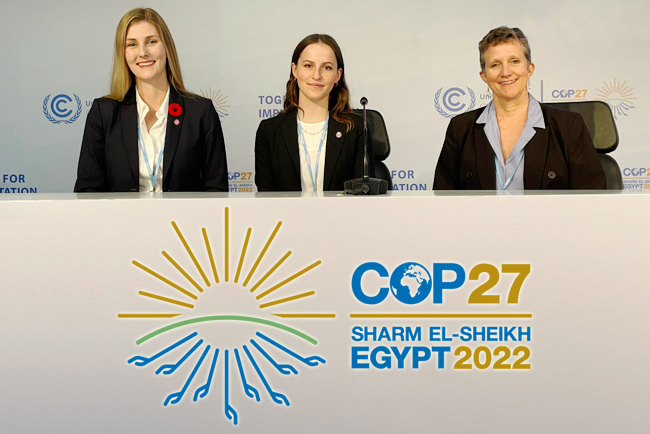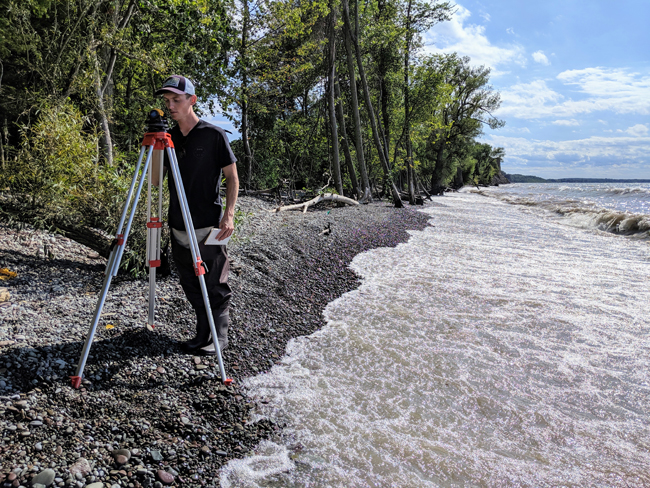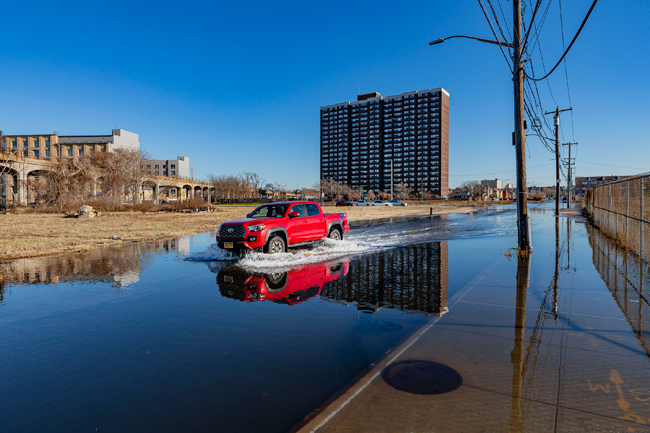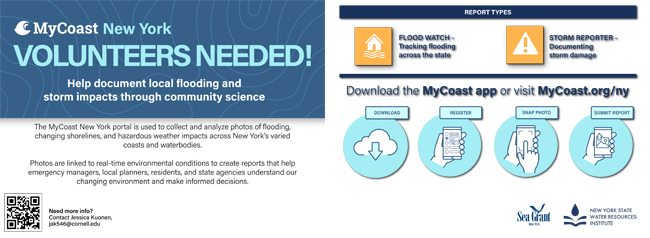Contacts:
Kathy Bunting-Howarth, NYSG's Associate Director, E: keb264@cornell.edu, P: (607) 255-2832
Katie Graziano, NYSG Coastal Resilience Extension Specialist, E: kag247@cornell.edu, P: (718) 951-5415
Kathleen Fallon, NYSG Coastal Processes & Hazards Specialist, E: kmf228@cornell.edu, P: (631) 632-8730
Jessica A. Kuonen, Hudson Estuary Resilience Specialist, NYSG E: jak546@cornell.edu, P: (845) 340-3990 x323

This past November, Kathy Bunting-Howarth (at far right), associate director of NYSG, was one of 23 Cornell University delegates in attendance at the 2022 United Nations Climate Change Conference (COP27) in Egypt. Cornell students (l-r) Katherine Cornett (College of Engineering) and Eva Fenningdorf (College of Arts and Sciences) joined Bunting-Howarth for a panel talk on the role of universities in discussions about ocean and climate, which you can watch along with another panel discussion via NYSG’s COP27 news item. There, you can also learn more about some of NYSG’s climate-related projects, including MyCoastNY, NYC Community Flood Watch, and Assessing Climate-Driven Migration in the U.S.
Ithaca, NY, March 28, 2023 — A handful of New York Sea Grant (NYSG) projects will receive support from a $8.1 million national investment to strengthen resilient coastal communities. NYSG's ongoing efforts such as Community Flood Watch in NYC as well as statewide initiatives focusing on the MyCoast NY community science platform and natural and nature-based shorelines will be bolstered and expanded.
The support comes via two complementary national initiatives aimed at improving resilience with coastal communities: (1) Through a joint competition with the U.S. Coastal Research Program, 10 new projects were selected for a total of $3.9 million in funding to translate research into application for communities; (2) Sea Grant programs across the nation received an additional total of $4.2 million in NOAA Sea Grant funds to increase local capacity, engagement, research, and implementation for addressing resilience challenges.
Shoreline Management Practices

New funding will support efforts to further extend knowledge about natural and nature-based features and resilient shorelines in New York. The project will build upon existing networks to bring applicable research and experiences to practitioners and foster conversations among investigators and professionals that will ensure shoreline monitoring, data analysis, visualization and research extension products are accessible and useful for the widest range of interested parties. Credit: Katie Graziano, New York Sea Grant
Communities near the shore are thinking about—and developing—their resilience to floods, especially as these disruptions are happening more frequently due to climate change. Climate change is not only affecting ecosystems, it is disrupting the economies dependent on the shore as a resource for tourism, leisure, and community well-being. With more frequent flooding in coastal areas, there has been growing interest in science- and nature-based solutions to help communities near the shore adapt.
Two years of funding totaling $150,000 is being provided for a NYSG effort to connect diverse end-users in New York City and New York State with relevant expertise about natural and nature-based features (NNBF) as multi-beneficial, more resilient alternatives to traditional shoreline armoring.
Instead of relying on hardened infrastructure such as seawalls, bulkheads, and revetments, New York State is encouraging coastal managers and landowners to consider greener alternatives, such as living shorelines, constructed marshes and sand dunes, and ecologically enhanced breakwaters and bulkheads.
These NNBFs are thought to provide similar risk-reduction benefits with fewer negative consequences. Yet despite a proliferation of these strategies in New York State, many questions remain about how well they can truly deliver risk reduction, ecological and community benefits.
The project leads — NYSG's Associate Director Kathy Bunting-Howarth, the Science and Resilience Institute at Jamaica Bay Director Brett Branco (Co-PI), and NYSG Coastal Resilience Extension Specialist Katie Graziano, along with support from a CUNY graduate student — will co-produce forums, workshops, data visualization and communications products, and formalize a community of practice to share key findings with local, national and international audiences.
This will build upon work detailed in a journal article published last year in Ecology and Society on "Operationalizing resilience" — how to define resilience in a way that it can be measured, assessed and promoted in design and policy.
“With this publication, we are sharing what we learned from a multi-year process of developing a framework to define and monitor shoreline resilience,” said Graziano, one of the report’s coauthors. “The paper contributes to the conversation among academics, policymakers, and the public about what resilience means in practice.”
Prior to the development of the monitoring framework, there was no way to track these benefits.
Expanding Community Resilience
An additional $125,000 in national support will allow NYSG to create a train-the-trainer program to grow Community Flood Watch in NYC and develop extension and outreach resources for the pilot MyCoast NY program to expand use of a publicly available, centralized database of crowd-sourced photos of flooding, storm damage, and shoreline change from across the state.

A truck plows down a flooded city street near the shore in Far Rockaway, Queens. This photo was taken on January 4, 2022 during a “sunny day” high tide flood event. “Sunny day” floods, also called “nuisance” or “tidal flooding,” bring a range of impacts to these and other coastal areas. Learn more in "Living with Water", a 2021 journal article published in Cities and the Environment. Credit: Giles Ashford, NYC Community Flood Watch Project
The Community Flood Watch Project — developed by NYSG, the Science and Resilience Institute at Jamaica Bay, NYC Mayor’s Office of Resiliency and USDA Forest Service — is a first-of-its-kind pilot project that began in 2018 to help neighborhood residents in NYC's Jamaica Bay region better understand the impacts of living with semi-regular flooding, how residents share information and take action on flooding, and what adaptation strategies the City and community can use to limit these impacts.
“Catastrophic flooding associated with large storms like hurricanes gain great attention, but people’s lives are often disrupted by the smaller, more frequent street-level floods that accompany high tides and high-intensity rain events,” said Bunting-Howarth.
“Community flood reports allow researchers to improve flood forecasts and alerts, empower residents to communicate flood impacts on their daily lives, and give decision-makers a better understanding of current issues and potential interventions,” added Graziano.
Such reports about floods in all types of weather, including on mild days, are valuable because they can help researchers improve forecasting models so that flood warnings can be more accurate and informative as sea level rises.

Download the MyCoast NY app at mycoast.org/NY and help document local flooding and storm impacts through community science.
MyCoast NY, both a downloadable app and web portal, can each provide you with a way to locally document increasing flood risk and uncertainty.
Developed by NYSG and the NYS Water Resources Institute, MyCoast NY is used to collect and analyze photos of flooding, changing shorelines, and hazardous weather impacts across New York's various waterbodies and builds off of the work of the Community Floodwatch Program, expanding it statewide.
The reports can be beneficial for emergency managers, local planners, residents, and state agencies to understand our changing environment and the impacts of flooding on every New York community.
“Photos of flooding show what will eventually happen more regularly,” said Kathleen Fallon, NYSG's Coastal Processes and Hazards specialist. “We’re starting to see these changes taking place now and they give a glimpse of what we can expect in the future.”
“Heavy rains are happening more often across New York as the Northeast becomes wetter,” said Jessica Kuonen, NYSG's Hudson Estuary specialist. “In addition, there’s more coastal flooding from high tides as the sea level rises. MyCoast NY is a way for New Yorkers to document—and learn about—these changes.”
More Info: New York Sea Grant
New York Sea Grant (NYSG), a cooperative program of Cornell University
and the State University of New York (SUNY), is one of 34 university-based
programs under the National Oceanic and Atmospheric Administration’s
National Sea Grant College Program.
Since 1971, NYSG has represented a statewide network of integrated
research, education and extension services promoting coastal community
economic vitality, environmental sustainability and citizen awareness
and understanding about the State’s marine and Great Lakes resources.
Through NYSG’s efforts, the combined talents of university scientists
and extension specialists help develop and transfer science-based
information to many coastal user groups—businesses and industries,
federal, state and local government decision-makers and agency managers,
educators, the media and the interested public.
The program maintains Great Lakes offices at Cornell University, SUNY
Buffalo, SUNY Oswego and the Wayne County Cooperative Extension office
in Newark. In the State's marine waters, NYSG has offices at Stony Brook
University in Long Island, Brooklyn College and Cornell Cooperative
Extension in NYC and Kingston in the Hudson Valley.
For updates on Sea Grant activities: www.nyseagrant.org has RSS, Facebook, Twitter, Instagram, and YouTube links. NYSG offers a free e-list sign up via www.nyseagrant.org/nycoastlines for its flagship publication, NY Coastlines/Currents, which is published quarterly.